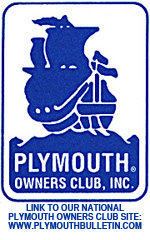What to take on a road trip in an unmodified 1954 Plymouth?
by Phil Hall
I was the guest speaker at our July [2022] meeting. My topic: What are the things one takes along on a cross-country road trip of forty-eight days and 9,866 miles in an unmodified 1954 Plymouth?
No one comes to a CPPC meeting expecting to have to take notes. Just as well, given my rapid fire, unscripted, off-the-wall, stream of consciousness delivery.
So, in the event that someone out there is interested, I thought I would put something on paper. Because cross-country road trips invariably involve climbing long mountain grades and other arduous driving, we try to avoid carrying unnecessary weight in our 100 horse power, 68-year-old car. When you see the following list, you will think that we did not try very hard to keep the weight down. Perhaps. In our defense, however, if things go south on you when you when you are thousands of miles from home, who you going to call? Look in the mirror. You are it. You the man.
Well then, what to take? Here you go in no particular order:
Miscellaneous non-essentials but nice: camp chairs, camp stove, enough clothes so as to hit the laundromat only once every five days, sense of humor, spirit of adventure
Emergency Stuff: Emergency fluorescent vest, 4 emergency triangle reflectors, 6 battery-operated-magnetic-red flashing lights, first aid kit
Tools: lightweight Portable Jumper Power Pack, Jumper cables, Starter fluid, Set of standard size SAE wrenches, Set of short SAE wrenches, Set of SAE line wrenches, Set of crescent wrenches, 3/8 drive SAE socket set, Emory board, Regular pliers, Needle nose pliers, Set of Allen wrenches, Set of ignition wrenches, Feeler gauges, Timing light, Scissors, Paper hole punch, Gasket material, Medium size screwdriver with variety of heads, Short Philips and short straight screwdrivers, Razor knife, Marking pen, Electrical tape, Duct tape, Rechargeable vacuum, Good supply of microfiber and cotton towels, A few large towels, Detailer (Meguiars Ultimate Quick Detailer or Griots Best of Show Detailer), Car wash in small containers, Car wash mitt, Small bucket, Simple green, Paper towels, Window cleaner, Starting fluid, 1954 Plymouth Shop Manual, Small dropper bottle of oil, Small flashlight, Medium strength thread lock, Right Stuff One Minute gasket maker, Fuel filter, Oil filter, Bottle of Go Jo hand cleaner, Package of Fast Orange hand cleaner towels, Small can of WD 40, Multimeter, Tire air pressure gauge, Knee pad, Wheel chocks, Bottle jack, 2x6x6 block of wood base for bottle jack, Four-way lug wrench, large flat screw driver to remove wheel cover, Fender cover
Spare Parts: Fuel pump, Water pump, Fan belt, Gasket material, Generator brushes, Contact Set (points), Condenser, Rotor, Distributor cap, Coil, Flasher, Radio vibrator, 1154 light bulbs, 6-volt headlights
I talked to a POC member at the 2019 National Meet in Springfield, Illinois regarding what to take along on a road trip in a classic car. His approach was to package certain heavier items, such as the spare water pump and fuel pump. He shows his family the location of the clearly labeled packages. If he needs one of the items while on the road, he will call home and his family will over-night the part to him wherever he happens to be broke down. Pretty cool idea.
If you do have trouble while you are out there, the first thing to do before you even get out of the car is to tell yourself “I got this”. Breathe in and breathe out and then get to it.
This isn’t a trouble shooting article, but just a few basic things. Be methodical. Step by step: fuel and electricity: If you have both of these then something has to go pop. You can easily look down the throat of the carburetor while cycling the throttle to see if fuel is the problem. Next is electricity, not quite as easy. Have someone turn it over and see if you have a strong spark at the coil and plugs. Be methodical. If you run through all the steps you can think of and you’re stuck, step away, take a few minutes off, then go back and retrace your steps. Get out your multimeter. Go from point to point. Be methodical.
Happy motoring.
Phil Hall


